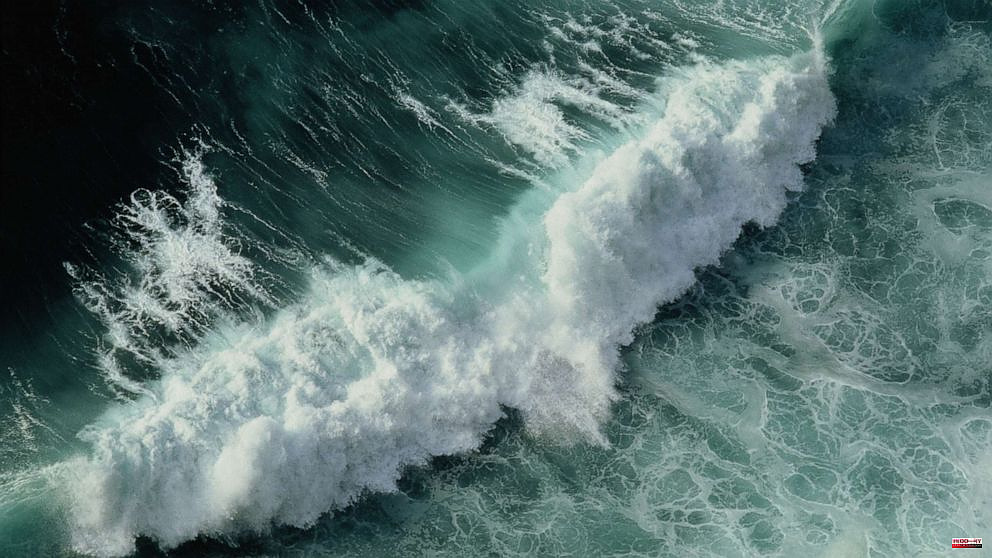The oceans are vital for life on Earth and bear the brunt global temperatures that have been rising steadily for decades.
In a special IPCC report, published in 2019, it was found that the oceans have absorbed between 20% to 30% of carbon dioxide emissions from humans since the 1980s. According to the Fifth Assessment report, published by the United Nations Intergovernmental Panel on Climate Change in 2013, they are responsible for more than 93% "combined heat" stored by warmed water, sea and land and melted ice since the 1970s.
Experts told ABC News that the tipping point is close. However, there are actions that can be taken collectively to make oceans healthier. This is the theme of United Nations World Oceans Day 2022.
Lea d'Auriol (founder of Oceanic Global), stated that oceans are the greatest ally in the climate crisis.
This is how climate change affects the health of the oceans around the world:
Currently, the oceans are in a "state of complete imbalance" which has almost doubled since 1990s, d’Auriol stated. As witnesses to climate change, d’Auriol said that fishermen are the best source of food for more than 3 billion people.
"If you were to ask anyone if climate change really is happening, the best person you could get is an answer from is a fisherman," Arlo Shemphill, senior oceans campaigner at Greenpeace USA told ABC News. Because fishermen can see these things happening in real-time.
Long-time fishermen are seeing changes in their fishing habits, such as new species moving north to the areas with the right water temperature.
Martin Grosell, professor of Ichthyology and chair of University of Miami's Department of Marine Biology and Ecology told ABC News that marine organisms are at the same temperature as their surrounding water. This means that they will not be affected by changes in temperature. The organisms need more energy to survive and move as the temperature increases. Grosell stated that the opposite is true. As the temperature rises, the oxygen levels in the water drop, which forces species to move.
Although it may seem like a minor problem, the migrations are disrupting ecosystems around the world. Hemphill stated that the timing of grey seal births and phenology is also affected by them.
However, many species are still dying due to repeated events like heatwaves in the oceans, Anne Christianson from the Center for American Progress, an international policy research organization, said to ABC News.
Scientists say coral reefs are one of the most endangered marine ecosystems in the globe. According to d'Auriol, coral bleaching is a process where the water temperature is too high and algae is expelled from the corals' tissues. This causes them to become completely white.
According to a study published by the National Academy of Sciences, coral reefs can stop growing within 10 years if greenhouse gases are not significantly reduced. In the worst case scenario, 94% of reefs could be lost by 2050.
Brenda Ekwurzel (director of climate science at the Union of Concerned Scientists), said that reefs can often be used to determine the health of an ecosystem.
Ekwurzel stated that Arctic ice-dependent mammals, like polar bears or ringed sealings, are at risk. They live almost their entire lives on Arctic ice.
Mangroves, marshes and seagrass plants, which are some of the most important carbon sinks on Earth, absorb and store carbon dioxide in the atmosphere, are also at high risk of extinction, d’Auriol stated.
According to the National Oceanic and Atmospheric Administration, a dead zone is an algal bloom that suckers up all of the oxygen in an area. This makes it impossible for marine life survive.
In 2008, Science published a study that found there were 400 dead zones in the world. According to d'Auriol, the number of dead areas had risen to around 900 by 2019.
Hemphill stated that dead zones are often found in areas with high nutrient runoff such as the Mississippi River base, which empties into the Gulf of Mexico.
According to the 2021 Arctic Report Card of NOAA, the Arctic is melting twice as fast than the rest. This is the largest contributor to sea level rising. Experts say that while 6 to 14 inch sea level rise since the Industrial Revolution may seem small, crucial infrastructure close to oceans was not designed to withstand the additional inches of water.
d'Auriol stated that millions of people who live along coastlines in the world, including in mega-cities like New York, Los Angeles, and San Francisco will be displaced due to the rising sea level.
Hemphill stated that ocean acidification is caused by water's pH being lowered by carbon dioxide in the atmosphere and not by warming temperatures. Instead, it is due to excess carbon dioxide emissions.
He said, "The alarming part about it is that shellfish everywhere from microscopic plankton to clams, crabs and coral reefs use calcium carbonate for their shells." It becomes harder to make shells as the ocean acidifies.
Ekwurzel stated that coral reef death will be caused by ocean acidification rather than coral bleaching.
According to d'Auriol, scientists and conservationists highlight the need for people, communities, nonprofits and the private sector to work together to solve problems. This is in line with the theme for World Oceans Day 2022, "Revitalization. Collective Action for the Ocean."
This means ensuring the health and safety of marine protected areas through the elimination of housing, fishing zones, and shipping traffic within the area, d'Auriol stated.
Christianson stated that governments will need policies to protect the health and life of the oceans, as well as human lives.
Christianson stated that there is no one solution to the crisis on land and in the ocean.
Experts said that the time is running out to reduce greenhouse gas emissions by a significant amount within the next decade.
Ekwurzel stated, "We can't afford not to delay these solutions any longer."
d'Auriol stated that the first step to properly protecting and preserving the oceans is getting rid of the myth that they are an environmental problem apart from climate change.
She said, "Because it's responsible to sustain all life on Earth, and we do live on an ocean planet."












